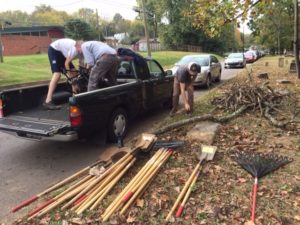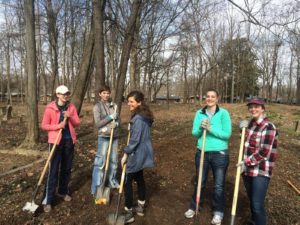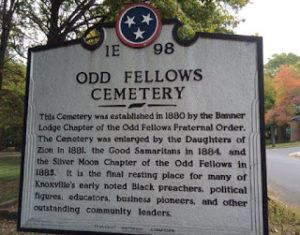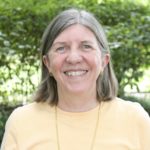The Upsilon Theta Chapter of Chi Sigma Iota (CSI), is the 2017 recipient of the CSI Outstanding Individual Program Award for its engagement with the Odd Fellows Cemetery Project. This award honors a chapter program that provides outstanding community service or professional development. The criteria include planning, committee involvement, length of time, recruitment strategies, advertising, media, and attendance at program. Two people were integral to this award – current service chair Justin Hawkersmith, and past service chair Kevin Webster.
 Justin is a master’s student in the Clinical Mental Health Counseling program and co-chaired the position with Kevin last fall. Kevin (’16) is an alumni of the Clinical Mental Health Counseling program and became the service chair in 2015. With the guidance and support of current and past faculty advisors (Casey Barrio Minton and Shawn Spurgeon, respectively), they helped create and grow relationships Upsilon Theta built with the Knoxville Reanimation Coalition and Katherine Ambroziak (associate professor from the College of Architecture and Design), who heads the project at the Odd Fellows Cemetery.
Justin is a master’s student in the Clinical Mental Health Counseling program and co-chaired the position with Kevin last fall. Kevin (’16) is an alumni of the Clinical Mental Health Counseling program and became the service chair in 2015. With the guidance and support of current and past faculty advisors (Casey Barrio Minton and Shawn Spurgeon, respectively), they helped create and grow relationships Upsilon Theta built with the Knoxville Reanimation Coalition and Katherine Ambroziak (associate professor from the College of Architecture and Design), who heads the project at the Odd Fellows Cemetery.
Kevin said, “I was sincerely elated and surprised, not because I didn’t think our project was worthy of recognition, but because I had not done anything like this before. Although recognition is not necessary, it can help keep momentum going for an organization. It can stimulate even bigger and better ideas and growth. I hope the award motivates others who join CSI to think about not only what they can do but also what is possible. I am also excited for what this means for the Knoxville Reanimation Coalition, the group whose mission it is to maintain, revitalize, and enhance the East Knoxville community. I think they are doing some of the most important work in Knoxville. They don’t do it for recognition; they engage in hard work to improve the neighborhood that is home to them.”
Justin expressed, “I am truly honored to be receiving this award and to see how Kevin and Katherine Ambroziak’s hard work has paid off. If there is anything I would like to add to this piece, it would be how important service and advocacy (the driving force of service) are to the counseling profession. If we truly want to serve our clients whether we are in schools or in mental health settings, we need to be active and intentional members of our community, and I think service events through Chi Sigma Iota are excellent way to begin that meaningful process of engagement.”
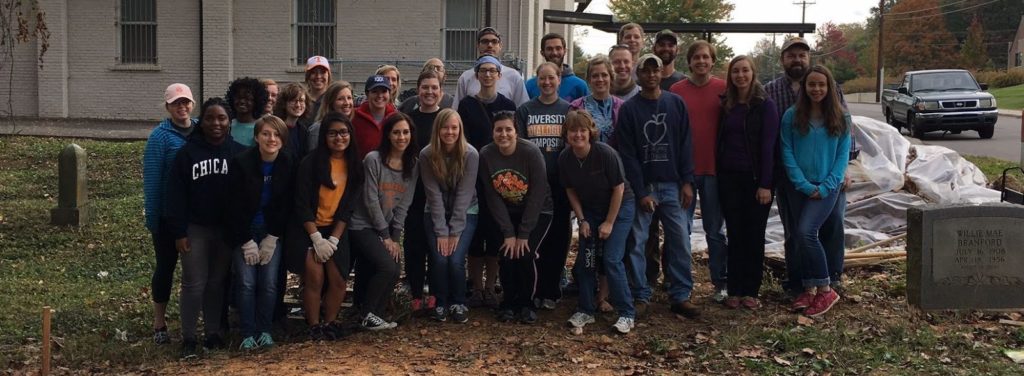 Kevin explained the application process:
Kevin explained the application process:
Every fall, CSI opens applications for chapter awards and student nominations for national positions. Casey Barrio Minton (associate professor), our current chapter advisor and long-time member of CSI, encouraged us to apply for the chapter award. I agreed with her that I thought it was a good idea, and I was happy to help. I honestly did not think we would have a chance because I thought the relationship was too new. However, since CSI-UT’s participation in the the Odd Fellows Cemetery project, our student engagement in service activities improved tremendously – in part because of the uniqueness of the project itself, in part from some new enthusiasm coming from the student board, and in part because I think there are some emerging ideas coming from the counseling community regarding social justice and community-level work that individual “therapy” simply does not address. Service and building community relationships are critical aspects of my life that I love and want to share with others, and I tried to provide that opportunity for anyone who was interested while I was service chair. So, naturally, I think others picked up on that.
Justin Hawkersmith and myself worked on the application proposal with Casey Barrio Minton and Katherine Ambroziak to submit letters of recommendation for the project. We spoke on not only what it meant to engage CSI counseling members in a project that was off campus and in a predominantly black community but also on the importance and meaning of the project itself. The cemetery represents an important part of black history and black heritage in Knoxville, and its current dilapidated state is worth the reflection and attention of the greater Knoxville community. Counselors, who more often than not are white and middle class, will go on to work with individuals from a variety of communities different than their own, but may not have an in-depth understanding of those communities and the issues within them. Given the current climate of our society, it is integral more than ever that organizations and university groups build and foster relationships and work on real problems.
Barrio Minton really helped make the process easy. Writing the application was the easy part, because the project meant a lot to me and Justin and I hoped to really see it continue even after I graduated from the program. Barrio Minton really helped pull it together, helped us stay organized, and made sure we had what we needed to submit a quality proposal.
Upsilon Theta was recognized and awarded during a ceremony held at the ACA Annual Conference and Expo in San Francisco, CA from March 16-19, 2017.
For more information about this project, check out the following Counselor Education blog stories:
CSI-UT Sponsors Service Event at Odd Fellows Cemetery
CSI-UT Returns to Odd Fellows Cemetery to Continue Service
CSI-UT Sponsors Service Event at Odd Fellows Cemetery
